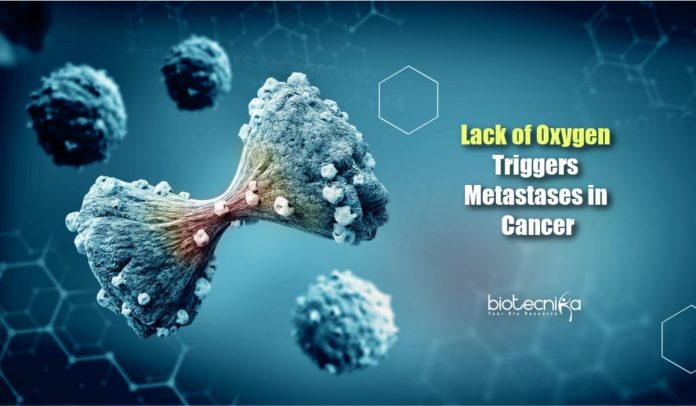Lack of Oxygen Trigger Metastasis in Cancer
The spread of cancer from the place it originally formed to another part of the body is called metastasis. Cancer cells break away from the original tumor in metastasis, travel though lymph or blood, and form a new tomorrow on other parts of the body.
According to previous studies, metastasis is caused by cells that shed from tumors and circulate the bloodstream (CTCs). This can also happen in early-stage cancers. However, it was not fully understood to date what is the biological phenomena that trigger the shedding of CTC clusters from a primary cancerous lesion. Now scientists from the University of Basel report that the separation of CTC clusters from the tumor could be sue to a lack of oxygen.
The journal Cell Reports published the study led by Nicola Aceto, PhD, group leader of the Cancer Metastasis Lab at the University of Basel and Swiss National Science Foundation assistant professor.
The researchers noted that they observed the majority of CTC clusters are undergoing hypoxia, and single CTCs are largely normoxic when dynamically labeled breast cancer cells along cancer progression.
The researchers studied the oxygen supply inside the tumors, detachment of CTCs, and their
cell biological and molecular properties using a mouse model for breast cancer, which is equivalent to human cancer tissue.Wherever the tumor had comparatively fewer blood vessels, cancer cells with a lack of oxygen were found. When they investigated the CTC clusters separated from tumors that trigger metastasis, they found that they have also suffered from a lack of oxygen. In the study, they reached to a conclusion that whenever enough oxygen is not present, cells leave tumors. When too many people are crowded in a small space, a few will go outside to get some air, explained Aceto.
Further studies indicated that metastases are formed faster with CTC clusters that lack oxygen, and mice’s survival time is shortened with them when compared to clusters with normal oxygen content. The CTC clusters will break away if a tumor does not have enough oxygen, noted Aceto.
Hypoxia is expected within regions that are poorly vascularized and in the core of a tumor. Since metastatic cancer cells need to have access to functional blood vessels to achieve dissemination, this is an apparent paradox in the context of metastasis biology. By directly studying the role of hypoxia in spontaneous metastasis models in vivo, in terms of CTC generation and metastasis, the researchers thought of tackling this controversy.
To boost the supply of oxygen to the tumor cells, researchers stimulated the formation of blood vessels. As expected, there was a reduction in the number of separating CTC clusters and metastases, and the mice lived longer. However, there was a significant increase in the size of the primary tumor.
The cancer cells have no reason to leave the tumor and cause metastasis if enough oxygen is provided, added Aceto. This, on the other hand, will accelerate the growth of the primary tumors.
The researchers are hoping to apply their findings in clinical settings and develop new treatment strategies for cancer. The researchers concluded that a new opportunity to blunt the metastatic spread of cancer in breast cancer patients could be provided by therapies aimed at reducing intra-tumor hypoxia, alone or in combination with anticancer agents.






























